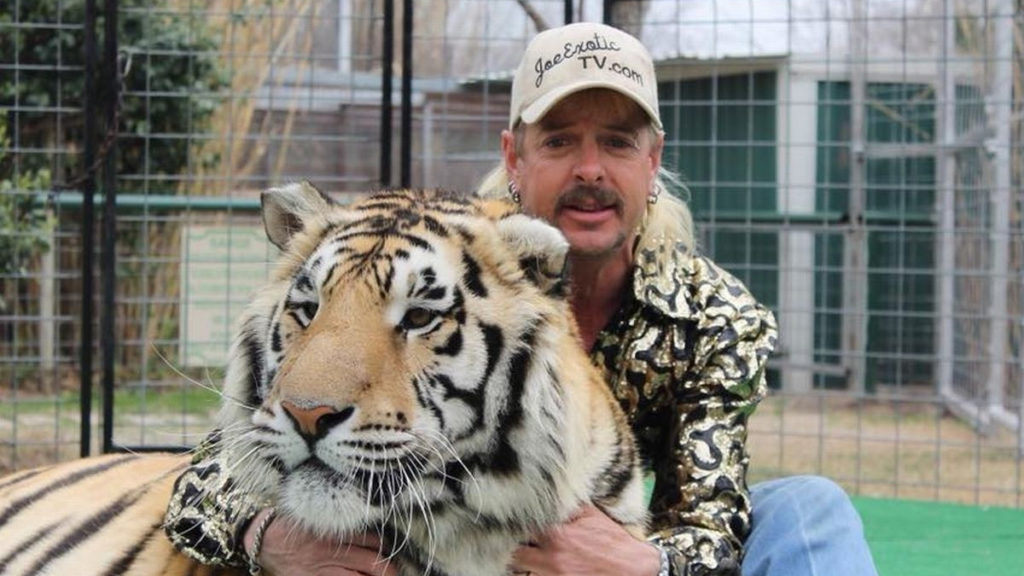Prologue
The year is somewhere between 1595 and 1597; no one knows for sure. Elizabeth I rules the British monarchy, raiding Spaniards burn Cornwall, and William Shakespeare’s immortal classic, Romeo and Juliet premieres for the first time.
Approximately 425 years later, the novel coronavirus COVID-19 causes a pandemic, millions of people are forced to quarantine themselves, and I, like so many others, finish watching Tiger King: Murder, Mayhem, and Madness on Netflix.
In it’s opening moments, Tiger King pulls an interesting trick. We see Rick Kirkman. He says we’re going to “start at the beginning.” And then the show proceeds to do the exact opposite.
We learn that a Oklahoma zookeeper has been arrested on charges of attempted murder. The first time we hear the now infamous name, “Joe Exotic,” is as he’s calling the documentary’s producers from jail. We know what happens to Joe long before we ever understand how or why.
This is a prologue for the show–an opening framing device that lends context to what follows. And it reminds me of Romeo and Juliet because that play has one of the most famous prologues in history. It frames the entire story, changes how we’ll perceive everything that follows, in just a few short lines at the beginning.
And it sets the tale up as a tragedy. Just like Tiger King.
Framing the Tiger King Story
There’s a reason I couldn’t stop thinking about Romeo and Juliet after I finished Tiger King. It’s not because they have a lot in common in terms of plot. But, like Tiger King, Spakespeare’s classic play takes its opening moments to tell you how it will end.
From forth the fatal loins of these two foes
A pair of star-cross’d lovers take their life;
Whose misadventur’d piteous overthrows
Doth with their death bury their parents’ strife.
That’s only a small section of it but you get the idea. Two young lovers gon’ die to end their parents’ strife. The question isn’t if, but how. Tiger King is just the same, except instead of a pair of star-cross’d lovers, we’ve got a gun-toting, animal abusing, drug-using, gay cowboy with a mullet.
Both prologues let you know who the protagonists are. Romeo and Juliet are the protagonists of their story. Joe Exotic is, unquestionably, the protagonist of Tiger King.
What is a Protagonist?
Predictably, the word comes from Greek. Protos means either “first” or “first in appearance.” The difference isn’t particularly important, but what is important is that the word doesn’t mean “good guy.” The protagonist isn’t necessarily a hero (Joe Exotic certainly isn’t). Walter White is a protagonist. Arthur Fleck is a protagonist. “First in appearance” doesn’t literally mean the first person you see. The protagonist is simply the person around whom the story revolves.
Sympathy for Joe Exotic
By framing Joe Exotic as the protagonist of a tragedy and by telling us something objectively bad (going to jail) happens to him in the end, Tiger King inclines it’s audience to feel sympathy for him. It doesn’t matter so much that he’s there for a reason. At this point, all we know is that the story is crazy and complicated. It would be premature, given this opening, to assume that Joe deserves to be in jail, and to subsequently go to prison. Maybe he was framed! The show doesn’t even fully dismiss that possibility by the end. How could we do so in the opening seconds?
Now, I’m not arguing this is a bad thing, inherently. Tiger King needed to have a story structure and Joe was the obvious choice for a protagonist for reasons we’ll explore later. But when you tell an audience that your protagonist is going to fall from grace, or “with their death bury their parents’ strife,” there’s baggage that comes with that.
Antagonists
An antagonist is, for better or worse, an adversary. That’s it; that’s all it means. Where am I going with this? Who is Joe Exotic’s adversary? Who could it possibly be??
Yeah, ok. This is about Carole Baskin.
Carole is Joe’s antagonist. He hates her like… like… like Joe Exotic hates Carole Baskin. There you go; it’s actually the purest example of hate I can think of.
Objectively, the fact that Joe hates Carole shouldn’t really color our opinion of her. From everything we’ve seen, it’s not like Joe is a guy with great judgement. But Joe has been framed as our protagonist. We have been trained by centuries, by millenia, of drama to sympathize with our protagonist and vilify their antagonist. Sure, antiheroes like Don Draper or even Gregory House exist, but they’re in the vast minority.
We’re predisposed to mistrust Carole because of the relationship the show establishes for us with Joe. As a result, the episode in which the documentarians craft a pretty compelling (albeit circumstantial) case that Carole murdered her husband feels like a confirmation of our suspicions. We want it to be true because if Carole is a murderer, that makes her a more compelling antagonist. We want drama.
Bias
There’s no such thing as a truly neutral story. Stories have conflict, which means disagreement, which means audiences or readers will have opinions about who is right and who is wrong.
I’m not saying Carole Baskin is innocent. At the very least, her use (arguably manipulation) of volunteers as free labor seems problematic, and it sure does seem like she’s using activism as a cover to hide that she just wants some of that good tiger action, too.
It seems like that’s the case. But I have to consider my bias as a viewer. It’s not that those things can’t be true, and it doesn’t mean the filmmakers didn’t let Carole tell her side of the story, either. She explains everything she does. It’s just that I, along with pretty much everyone else, find those explanations… pretty suspicious.
It’s not that we should be taking Carole at word, it’s that we need to be conscious of the factors, both overt and subliminal, that are at work as we form our opinions. Framing of Joe Exotic as the tragic protagonist of this narrative biases us against Carole Baskin.
Cause
There’s a good reason why Eric Goode and company made Joe Exotic the protagonist of their story. Not only was he deeply integrated into, and emblematic of, the big cat industry in the United States, but most (not all) stories benefit from having clear protagonists. That’s why they have them. They give the audience a perspective through which they can interpret events. Oftentimes, they serve as an avatar for the audience in the show. They are a person in the narrative with whom we can empathize, if not sympathize. Those things are all very important if you want to engage your audience in your story.
Eric Goode was very cognizant of his characters when making Tiger King. In an interview with the New York Times, he said:
“How do you create awareness about the suffering and exploitation of exotic animals but in a way where you can engage an audience? It was equally important for me to dig into the pathology of these characters as it was to expose the horrible practices of exploiting these animals.”
That’s the cause of this structure, of this framing: to make the content compelling for audiences and get the message out there. And you can’t say he didn’t do a hell of a job! Tiger King is must-watch tv. It’s hard to rip your eyes away. And certainly there are many people who are much more aware of the plight of big cats in this country than there were before. Framing Joe Exotic as protagonist and Carole Baskin (and–fighting back vomit–Jeff Lowe) as antagonist are arguably integral to the success of Tiger King.
Effect
What are the effects of the structure? Well, there’s the aforementioned success, but there’s also people standing outside Jeff Lowe’s house, waiting for him to go to Walmart. There’s hate mail galore going to Carole Baskin. There were even reports that Kanye West and Kim wanted Donald Trump to get Joe Exotic released. That all looks objectively bad for society, but maybe that’s the cost of getting the message out there.
What’s the good that came from Tiger King? Awareness of animal abuse; absolutely. Not insignificantly, it also provided millions of people with joy, or at least distraction, in a very challenging time. That’s not to be discounted.
I’m not here to put Eric Goode on trial, and I’m not here to defend Carole Baskin or–holds back more vomit–Jeff Lowe. We did a deep dive into the responsibility (or lack thereof) that filmmakers have to their audiences on our podcast and I encourage you to check that out.
What I do want to do is draw attention to what a powerful storytelling tool framing can be and how it colors everything we experience in a narrative. There’s a reason that prologue from Romeo and Juliet remains in my mind 425-odd years after it was first performed. Spoilers weren’t a consideration. The framing was there because the tragedy of doomed characters added drama to the story.
And as we saw with Tiger King, it still does.

